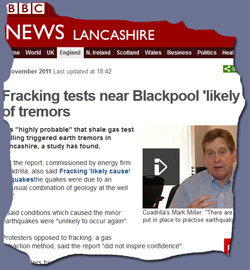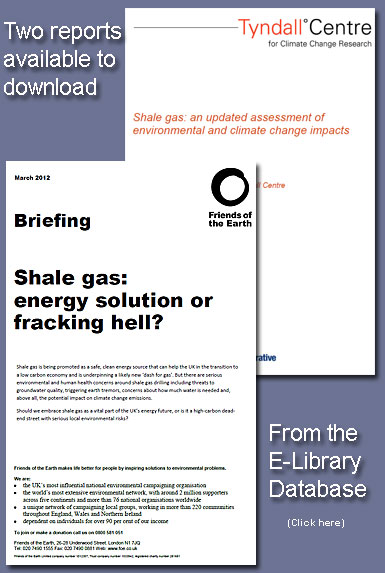Natural gas has recently emerged, it is claimed, as a relatively clean energy source that offers the opportunity for a number of regions around the world to reduce their reliance on energy imports. It is also claimed that it can serve as a transition fuel that will allow for the shift from coal to renewable energy resources while helping to reduce the emissions of CO2, criteria pollutants, and mercury by the power sector.
Hydraulic fracturing, widely known as "fracking," is a relatively inexpensive way to tap into what were previously inaccessible natural gas resources. Drilling multiple horizontal wells from a single well pad allows access to as much as 1 square mile of shale that is located more than a mile below.
 With the incidents of earthquakes, said to be caused by ‘fracking’ the latest of which is known to have occurred in Blackpool, concern exists worldwide about the detrimental impact the process has on the environment; not only in terms of geological disruption, but also the possible contamination of the water table and nearby water supplies used as drinking water by the local population.
With the incidents of earthquakes, said to be caused by ‘fracking’ the latest of which is known to have occurred in Blackpool, concern exists worldwide about the detrimental impact the process has on the environment; not only in terms of geological disruption, but also the possible contamination of the water table and nearby water supplies used as drinking water by the local population.
Horizontal drilling and hydraulic fracturing make the extraction of tightly bound natural gas from shale formations economically feasible. These technologies are not free from environmental risks, however, especially those related to regional water quality, such as gas migration, contaminant transport through induced and natural fractures, wastewater discharge, and accidental spills.
However, ensuring access to monitoring data is an important first step toward addressing any public and environmental health concerns, but the ability to collect accurate meaningful data is compromised by ‘commercial confidentiality’ excuses used as a means to deny scientific scrutiny of the processes and impact on the water table and other environmental impact.
Whilst in the US a boom in shale gas has brought energy prices tumbling and revitalised heavy industry, UK’s Energy and Climate Change Committee warns conditions are different in Britain. The UK is a more densely populated landscape, and shale gas operations will be closer to settlements as a consequence. Further, the extent of recoverable shale gas in the UK is unknown, so the report concludes that it is too soon to say whether shale gas will be to the UK what it is to our American cousins.
The government insists that success with shale gas will reduce dependence on imports and increase tax revenues. But, shale gas takes off, it will shatter the UK's statutory climate change targets unless the government moves much faster with carbon capture and storage technology.
Tim Yeo, chairman of the Energy and Climate Change Committee, is quoted by the BBC News website as saying:
"It is still too soon to call whether shale gas will provide the silver bullet needed to solve our energy problems. Although the US shale gas has seen a dramatic fall in domestic gas prices, a similar 'revolution' here is not certain."
Tony Bosworth, from Friends of the Earth, reportedly responded:
"This does little to back the case for a UK shale gas revolution. Fracking is dirty and unnecessary – it's little wonder so many communities are in opposition. We should be building an affordable power system based on our abundant clean energy from the wind, waves and sun.”
The most common problem with shale gas well construction is a faulty seal that is in place to prevent gas migration into shallow groundwater. The incidence rate of seal problems in unconventional gas wells is relatively low (1 to 3%), but there is a substantial controversy whether the methane detected in private groundwater wells in the area where drilling for unconventional gas is ongoing was caused by well drilling or natural processes. It is difficult to resolve this issue because many areas have long had sources of methane unrelated to hydraulic fracturing, and pre-drilling baseline data are often unavailable.
 Water management for unconventional shale gas extraction is one of the key issues that will dominate environmental debate surrounding the gas industry. Re-use of produced water for hydraulic fracturing is currently addressing the concerns regarding the vast quantities of contaminants that are brought to the surface. As these well fields mature and the opportunities for wastewater reuse diminish, the need to find alternative management strategies for this wastewater will likely intensify.
Water management for unconventional shale gas extraction is one of the key issues that will dominate environmental debate surrounding the gas industry. Re-use of produced water for hydraulic fracturing is currently addressing the concerns regarding the vast quantities of contaminants that are brought to the surface. As these well fields mature and the opportunities for wastewater reuse diminish, the need to find alternative management strategies for this wastewater will likely intensify.
Global warming is sited as the reason to use unconventional methods of energy supply, but as Jenny Banks from the World Wildlife Fund UK said:
"It's simply impossible to keep global warming below 2C and burn all known fossil fuel reserves – let alone exploit unconventional reserves like shale gas.
In other words, the climate impacts of new fossil fuel developments must be front and centre of any decision on shale gas, not a secondary concern."
But as governments will no doubt ignore such warnings, and shale gas production will go ahead in the UK, an improved understanding of the fate and transport of contaminants of concern and increased long-term monitoring and data dissemination will help effectively manage water-quality risks associated with unconventional gas industry today and in the future.
Confidentiality requirements dictated by legal investigations combined with the expedited rate of development and the limited funding for research are major impediments to peer-reviewed research into environmental impacts.
Indeed this is confirmed in a report commissioned by the UK’s only ‘ethical’ bank, the Cooperative Bank, which states in its introduction:
To date the only significant development and exploitation of shale gas has been in
the United States (US). However, even there, significant environmental issues remain
unresolved, and reserve estimates show little sign of stabilising (increasing seven
times in the last four years). Inevitably therefore, assessments of the environmental
impacts, reserve potential and subsequently the greenhouse gas emissions for the
European Union (EU) and the UK’s fledging shale gas sector, remain subject to
significant levels of uncertainty."
Many argue that now is the time to work on these environmental issues to avoid an adverse environmental legacy in the UK and subsequent public hostility to shale gas production similar to that from the abandoned coal mine discharges in Pennsylvania in the USA.
There are two recent reports to download on Shale Gas production available from the E-Library Database. Select the search category ‘environment’ or keyword ‘fracking’ to find the documents.
Source: Science Mag / BBC News / Friends Of The Earth / Manchester University / World Wildlife Fund UK



